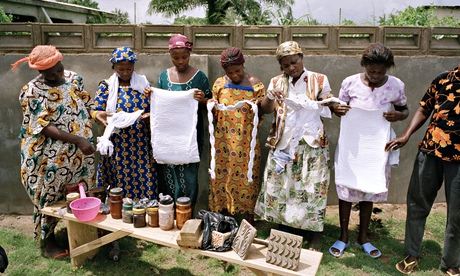Welcome
....to JusticeGhana Group

JusticeGhana is a Non-Governmental [and-not-for- profit] Organization (NGO) with a strong belief in Justice, Security and Progress....” More Details
Ghana’s big business and informal traders alike hit by crumbling economy
- Details
- Parent Category: Our Country
- Category: Business & Finance
- Created on Monday, 29 September 2014 00:00
- Hits: 8111
 Ghana’s big business and informal traders alike hit by crumbling economy
Ghana’s big business and informal traders alike hit by crumbling economy
From internships for girls to large infrastructure projects, development in Ghana is being stymied by the fiscal crisis
Billie Adwoa McTernan in Accra
In the midday sun, young women and girls around Accra’s Makola market take a break from walking the streets carrying their wares to seek solace under the shade of a tree, napping with their babies in their laps.
There are thousands of girls like these dotted around Ghana’s big cities, having migrated from the north to the south of the country, uneducated and caring for their children.
Although the country is close to removing disparities in primary school education between boys and girls by next year and meeting the millennium development goal on universal access, the target for secondary and tertiary education is further off.
In the absence of government help, it is left to NGOs to offer young women alternative futures.
Since 2008, the Akua Kuenyehia Foundation has been providing scholarships, and organising camps and internships for bright secondary school girls whose parents are petty traders and small-scale farmers.
“To say that their families have a monthly household income of up to 200 cedis [about £32] would be too much,” says the executive director of the foundation, Akofa Bentsi-Enchill. “When you sit in the interviews or read their scripts [applications] you weep.”
Wilhelmina Bofla, 19, whose mother sells roasted plantain on the street, has benefited from the foundation. After completing secondary school, the foundation found her a year-long paid internship. She saved some of her income towards her university education. In September, she will take up a place at the University of Cape Coast.
But Ghana’s economic difficulties are beginning to affect the foundation’s funding, with local donations drying up. The country’s economic downturn is being felt at all levels of society, affecting big businesses and informal traders alike.
Cutbacks in the civil service loom, while payments for the Livelihood Empowerment Against Poverty scheme, which provides cash transfers to some of the country’s poorest people, were in arrears from November 2012 till October last year. This year, payments for March to June were made in July.
In August an initiative by the department of social welfare to remove children begging on the streets, acting as aides for disabled relatives, was put on hold due to a lack of funds. The department had intended to admit children into shelters and provide funding for their school and medical needs.
“It is not limited. The current fiscal challenges cut across all areas of government,” says Kenneth Owusu, senior policy analyst at the national development planning commission (NDPC).
With the private sector driving growth in Ghana, the economic slowdown has had a direct impact on development.
“Any time you see fiscal slippages you are likely to see the other indicators also performing poorly,” Owusu says.
“The ease of doing business is becoming quite troubling and the cost of doing business has increased significantly,” he adds. “There are power outages which are affecting most companies and other infrastructure challenges.”
Before the 2012 presidential election the ruling National Democratic Congress pledged to support women with small- to medium-sized businesses by widening their access to credit. But for some the support is yet to come.
In Labadi town, a neighbourhood close to central Accra, stand clusters of crumpled homes overlooking the sewage-filled sea. Here, 51-year-old Mabel Tetteh works as a secretary for the Labadi market traders’ association, a group made up predominantly of women.
“We have not had any help from government,” Tetteh says. The market traders are often approached by individuals offering high-interest loans, and with no other options the traders are left to deal with private lenders to expand their business.
Tetteh has spent her whole life working in the market – apart from a spell at school – and used to help her mother there as a child. Now, standing beside pyramids of tomatoes, onions, spices and grains, Tetteh proudly gestures towards her container of food that she was able to acquire through loans.
“We would prefer government loans as the interest rate would be lower,” Tetteh says. “But for now we don’t have that choice, so we are waiting for them.”
It may be a long wait, as there is a backlog of infrastructure projects that the government is looking to finance – including the repair and development of rail and road networks in the Eastern Corridor – as well as covering outstanding debt repayments.
The commission is pushing to pass a fiscal responsibility bill in parliament that would increase financial discipline, particularly in the finance ministry. High levels of spending, particularly on a large public sector wage bill, are partly blamed for the crisis.
“At the moment if the ministry of finance overspends they can just go to parliament and ask for a supplementary budget. There should be some sanctions,” says Owusu. “Development is the engine of the country. You cannot leave it to chance. We [shouldn’t] have to beg our developing partners to support the commission.”
Source: The Guardian UK




